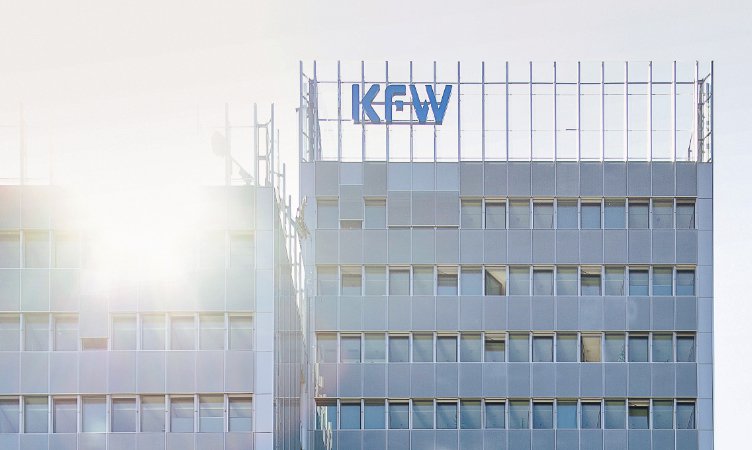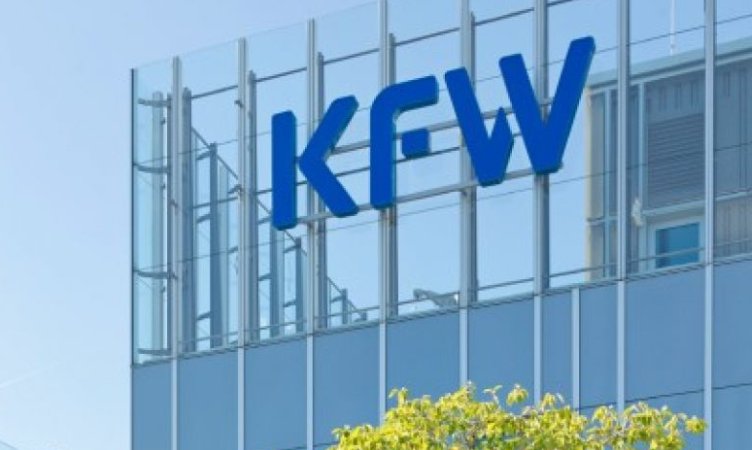Discussing pathways to a sustainable financial world

KfW Group’s key stakeholders increasingly regard the company as a pioneer, particularly when it comes to sustainable finance. In the EU’s view, this entails nothing less than the transformation of the financial markets.
As the promotional bank of the German Federal Government and the federal states, KfW Group relies on transparency and dialogue as building blocks of its corporate culture. This also includes the annual Stakeholder Dialogue, which was last held in Berlin on 26 February 2019. The theme this time was “Sustainable Finance” – an initiative for more sustainability in financial markets initiated particularly by the European Commission.
Stakeholder Round Table 2019 about sustainable finance
Policymakers are becoming active
With the “Action Plan: Financing Sustainable Growth” – also known as Sustainable Finance – the European Commission launched an important initiative: in ten action areas, it clarifies what the financial sector’s contribution to sustainable development could – and should – look like. After all, advice alone is certainly not enough if the EU devotes three commissioners to one policy area.
And this is the main difference from previous initiatives, whether they came from the financial market, civil society or the political arena. Awareness of the threats posed by climate change and other environmental factors is now greater than ever. The pressure to act is growing, and policymakers are becoming active.
As the bank of the German Federal Government and the federal states, KfW is naturally close to the political sphere. It creates financial incentives to implement policy resolutions. But how it does this exactly, which priorities it sets, what instruments it uses – this is all also part of a societal debate, which also took place on a smaller scale as part of the KfW Stakeholder Dialogue at the KfW office in Berlin.
One focus of discussions was that sceptics still need to be convinced, also in the political realm. And this is despite the fact that, by signing the Paris Agreement, the German Federal Government made a legal commitment to meeting the Sustainable Development Goals of the United Nations and complying with the EU’s energy and climate policy. Questions like “Why sustainability?” or “Why climate change mitigation?” actually should not come up any more.

Many have not yet fully grasped the overall context. We have legally binding obligations arising from international agreements. Implementation is mandatory.
No climate change mitigation? Too risky!
In recent years, studies conducted by the Intergovernmental Panel on Climate Change (IPCC) and renowned research institutes have time and again clearly substantiated how crucial climate change mitigation is. KfW stakeholders referenced the most recent position paper of the Chief Risk Officers’ Forum. The document published in January 2019 calculated that even if the two-degree target set by the international community were to be reached, there would still be considerable economic losses due to climate change. Even in this case, the gross global product would be 10% lower – and even 23% lower with an average warming of three degrees. It is therefore no surprise that the German Central Bank and the Federal Financial Supervisory Authority (BaFin – Bundesanstalt für Finanzdienstleistungsaufsicht) are now also tackling climate risks.

I assume that we will have to address sustainability very soon, also in the interest of financial stability.
Redirecting financial flows
The aim of efforts in sustainable finance is thus to mobilise financial resources that will help slow the pace of climate change and promote more sustainable economies. The KfW Stakeholder Roundtable served as a platform for collecting and discussing ideas, needs and expectations and including them in recommendations to KfW’s Executive Board.
KfW has already set the course for 2018 with its Roadmap Sustainable Finance: by 2020 a concept will have been drawn up outlining how KfW can align its German and international promotional business to further advance the achievement of its sustainability goals. One building block of the concept, this much is already certain, is communication: the development of goals and measures in dialogue with society.
The changes – despite the concentration on the financial markets – will have to be made primarily in the real economy. To support this change, financing must flow in the right direction. KfW will vigorously scrutinise management of its financing operations and promote green and sustainable investments even more intensively. And what is meant by “green” or “sustainable” will also depend on the definitions currently being drafted under the EU Action Plan. This completes the circle and brings us closer to the goals of the UN and the EU, to which the German Federal Government is committed.
For me, environmental and climate issues are the social issues of the 21st century.

The aim is not to shut down industries, but to direct resources to places where the speed of transformation, the direction and the level of ambition are sufficient.
Promoting and challenging
However, the difficulties in accepting sustainability still pose an obstacle in broad sectors of the economy and politics. Despite all the very positive momentum, sustainability in the financial market often still merely occupies a niche – only a low single-digit percentage of the funds invested in German-speaking countries flows into sustainable investments. Participants in the dialogue pointed out that the “breadth of economists” still did not see a “business case” for sustainable investments.
It is essential that the issue shifts from the niche market to the mainstream. Financial education plays a very important role.
In addition to a lack of education, stakeholders also criticised a high level of unwillingness and inability to make changes – factors that can only be explained by behavioural science. This is due to the fact that political regulation with incentives to change behaviour has been lacking until now. The EU Action Plan aims to close this gap, at least in the financial sector, with its legislative initiatives – to promote meaningful sustainability measures and, if necessary, to demand them through regulation.
Now it is very important to make rapid and forward-looking progress at legislative level too. This is the only way we will achieve the necessary changes within a reasonable timeframe.
KfW must be a pioneer
The Stakeholder Roundtable showed that the greatest expectation that stakeholders in the sustainable finance environment currently have of KfW is that it should play a pioneering role. It should show other financial institutions ways to integrate sustainability into their business processes – ranging from lending and investments to their own investments. At the dialogue event, even stakeholders from opposite ends of the spectrum agreed that, as a promotional bank, KfW should be providing guidance and acting as a role model.

KfW has a public promotional mandate, which automatically gives rise to its function as a role model.”
KfW could, for example, be involved in the development of measuring instruments that contain suitable criteria and indicators to achieve sustainable progress – for example, in the implementation of the Sustainable Development Goals of the United Nations. Another proposal from the Roundtable relates to financial cooperation with developing countries and emerging economies: preference could be given to countries that have national implementation plans for the Paris Agreement. Many smaller financial institutions do not have the resources or the expertise to calculate scenarios that show how a lack of sustainability could impact local business. KfW could also lead the way with models in these efforts. And the positive experiences that KfW has had in Germany, for example with the group’s energy-efficient houses, should be better publicised internationally because there is great demand for this kind of concept.
The function of promotional banks as role models cannot be overemphasised. Many KfW products are so good, they are ground-breaking. That is exactly what we need now.

KfW should also play a supporting role as a political catalyst for best practices.
Transformation or transition?
The wide range of proposals raised at the dialogue event will now be incorporated into KfW’s ongoing strategic development. The stakeholders’ message, that they see the bank in a pioneering role, and their concrete proposals offer many ideas for further discussion in the near future.
With its products in the areas of financing, risk instruments and advisory services, KfW will certainly make its contribution to the sustainable transformation of the financial markets – and thus also of the real economy. This could entail a more subtle transition rather than an abrupt transformation at KfW. But the direction and also the resolve are beyond all doubt.

We want to support our customers in bringing their actions into line with international climate and sustainability goals.

The clarity with which the stakeholders highlighted KfW’s pioneering role is impressive. Assuming and fulfilling this role – for example as part of the internal KfW Roadmap Sustainable Finance project – is a major responsibility.


















